1979

John Kennedy Toole received the 1981 Pulitzer Prize posthumously for A Confederacy of Dunces, published by Louisiana State University Press with support from the NEA. Image courtesy of Louisiana State University Press
Ignatius Reilly, the anti-hero of John Kennedy Toole's tragicomic novel A Confederacy of Dunces, is one of the most memorable characters in American literature. Yet when Toole committed suicide in 1969, the novel was still in manuscript, having been rejected by numerous publishers. It wasn't until more than a decade later that the novel was published, thanks to vigorous lobbying efforts by Toole's mother Thelma.
Born in New Orleans, Louisiana, Toole penned most of A Confederacy of Dunces while stationed with the army in Puerto Rico, where he taught English to Spanish-speaking recruits. After Toole's death, Thelma Toole continued to send the manuscript to various publishers. The project was seen as a bad commercial risk, however, because the author was not available to publicize the book and no future novels were forthcoming. Finally, in 1976, Mrs. Toole showed the smeared and fading manuscript to novelist Walker Percy who was then teaching at Loyola. Percy in turn recommended it for publication to the Louisiana State University Press (LSUP), which had just started to publish literary fiction.
One of the oldest university presses in the U.S., LSUP applied to the Arts Endowment for a grant to help with the publishing costs for the novel. The press received a grant of $3,500, and the novel was finally published in 1980. In the first year alone, the novel sold more than 50,000 copies. Toole also was awarded the 1981 Pulitzer Prize for Fiction posthumously, beating out fellow finalists Frederick Buechner and William Maxwell. A Confederacy of Dunces has since been published worldwide in 18 languages, and there are nearly two million copies in print.
A Confederacy of Dunces continues to be recognized as a classic American novel and a canonical work of modern Southern literature. As a Rolling Stone reviewer once wrote, "A Confederacy of Dunces has been reviewed almost everywhere, and every reviewer has loved it. For once, everyone is right."

